Best web hosting: Top providers for 2025

The best web host depends on your specific needs, but Hostinger is the top choice for its overall performance, pricing, and comprehensive features.
Other providers stand out in specific areas. For example, Bluehost is ideal for WordPress sites, while SiteGround is a strong option for beginners.
Here’s a quick breakdown of the best hosting services in 2025 by category:
- Best overall. Hostinger is the leading provider for its excellent speed, robust security, and value-packed plans.
- Best for WordPress. Bluehost offers a reliable and user-friendly experience specifically tailored for new WordPress users.
- Best for beginners. SiteGround offers an intuitive platform with strong support for those new to web hosting.
- Best value. DreamHost is a great option for straightforward hosting with generous features and a solid uptime guarantee.
- Best for high performance. Hosting.com delivers robust, fast-loading solutions for high-traffic websites.
Quick comparison of the best web hosting services
The table below compares the key metrics of the top web hosting providers, focusing on essential features such as starting price, storage, bandwidth, number of websites, and whether free SSL certificates, backups, and migrations are included.
| Name | Price (starts at) | Storage (lowest-tier plan) | Websites (lowest-tier plan) | Bandwidth | Free domain (first year) | Free backups | Free migrations | Free SSL |
| Hostinger | $2.99/month | 25 GB NVMe | 25 | Unlimited | ✅ | Weekly | ✅ | ✅ |
| Bluehost | $3.99/month | 10 GB NVMe | 1 | Unmetered | ✅ | Weekly | ✅ | ✅ |
| DreamHost | $2.59/month | 50 GB | 1 | Unmetered | ✅ | Daily | ✅ | ✅ |
| SiteGround | $2.99/month | 10 GB | 1 | Unmetered | ✅ | Daily | ✅ (WordPress sites only) | ✅ |
| InMotion Hosting | $2.99/month | 100 GB | 1 | Unmetered | ✅ | Daily | ✅ | ✅ |
| HostGator | $3.95/month | 10 GB SSD | 10 | Unmetered | ✅ | ❌ | ✅ (WordPress sites only) | ✅ |
| Ionos | $1.00/month | 10 GB | 1 | Unmetered | ✅ | Daily | ❌ | ✅ |
| Hosting.com | $1.99/month | 15 GB | 1 | Unlimited | ✅ | Weekly | ✅ | ✅ |
| Namecheap | $1.98/month | 20 GB SSD | 3 | Unmetered | ✅ | Twice a week | ✅ | ✅ |
| GoDaddy | $5.99/month | 25 GB NVMe | 1 | Unmetered | ✅ | Daily | ✅ | ✅ |
1. Hostinger
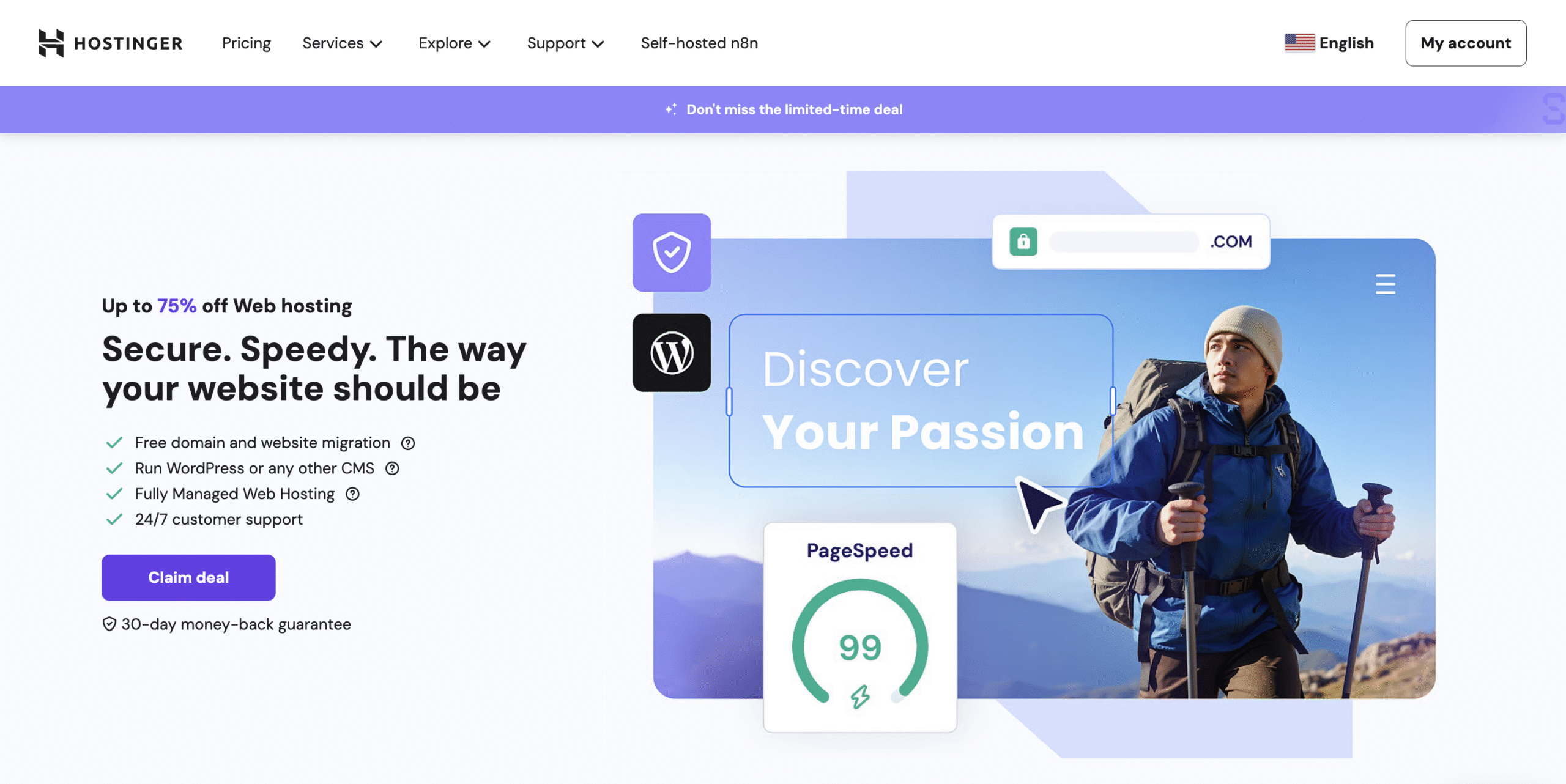
Hostinger stats:
- Best for: Users seeking the best overall value and performance for any type of website.
- Price: Starting at $2.99/month.
- Resources: Up to 100 GB NVMe storage, unlimited bandwidth, a free domain, weekly backups, free unlimited website migration, and free unlimited SSL.
Hostinger stands out as the best overall web hosting provider, delivering exceptional speed, security, and value. Its managed hosting plans are packed with premium features at an entry-level price point, making them ideal for nearly any project.
Even the lowest-tier Premium plan, starting at $2.99/month, provides everything you need to launch and grow up to 25 websites. It offers a free domain with WHOIS privacy, 25 GB of NVMe storage, unlimited bandwidth, and unlimited free SSL certificates.
Some competitors don’t include a free domain or SSL with their entry-level plans, while Hostinger offers both at no extra cost.
Additionally, unlike many providers that charge extra for migrations or impose limits, Hostinger includes unlimited free website migrations in every plan.
Key features:
- AI-powered features. Tools like the AI Website Builder, AI Troubleshooter, and Kodee AI Agent simplify website creation and management.
- In-house CDN. The built-in content delivery network (CDN) improves website loading times by up to 40% for visitors worldwide.
- Complete security suite. You get automatic malware scanning, a web application firewall (WAF), and DDoS protection at no extra cost.
- Managed WordPress. All plans come with managed WordPress features like automatic updates, vulnerability scanning, and a speed-accelerating tool.
- Global data centers. Hostinger has data centers across four continents so that you can host your site closer to your audience for better performance.
- 24/7 multilingual support. The Customer Success team is available around the clock to help with any technical questions.

2. Bluehost
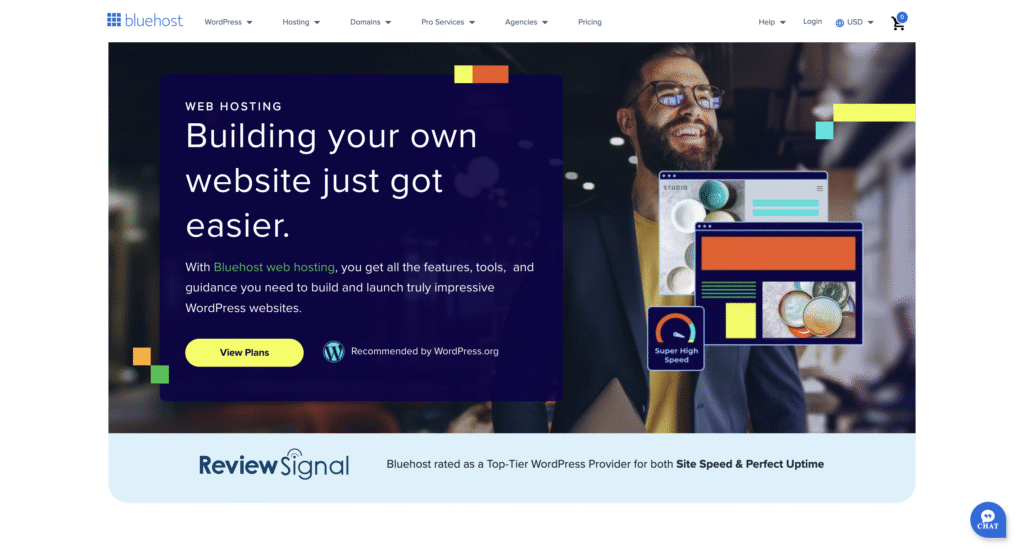
Bluehost stats:
- Best for: Beginners launching their first WordPress site.
- Price: Starting at $3.99/month.
- Resources: Up to 100 GB storage, unmetered bandwidth, a free domain, and a free SSL certificate.
Bluehost is a popular and reliable choice in the web hosting market, especially for new users building a site with WordPress. Its plans are straightforward and provide the essentials to get a simple website online, including a free domain for the first year and a free SSL certificate.
The main drawback is the limited resources on entry-level plans. The Starter plan comes with only 10 GB of SSD storage, which can be restrictive for growing sites.
Furthermore, while Bluehost offers a free plugin to migrate WordPress sites on your own, its expert, hands-off migration service costs $149.99 per migration.
Key features:
- WordPress site builder. An integrated drag-and-drop builder to help beginners create a WordPress site without code.
- Custom WordPress themes. Access to a marketplace of themes to customize your site’s design.
- WordPress-focused support. Bluehost’s support is specifically trained to handle common WordPress questions and issues.
- 24/7 customer support. You can contact the support team via phone and live chat.
3. DreamHost
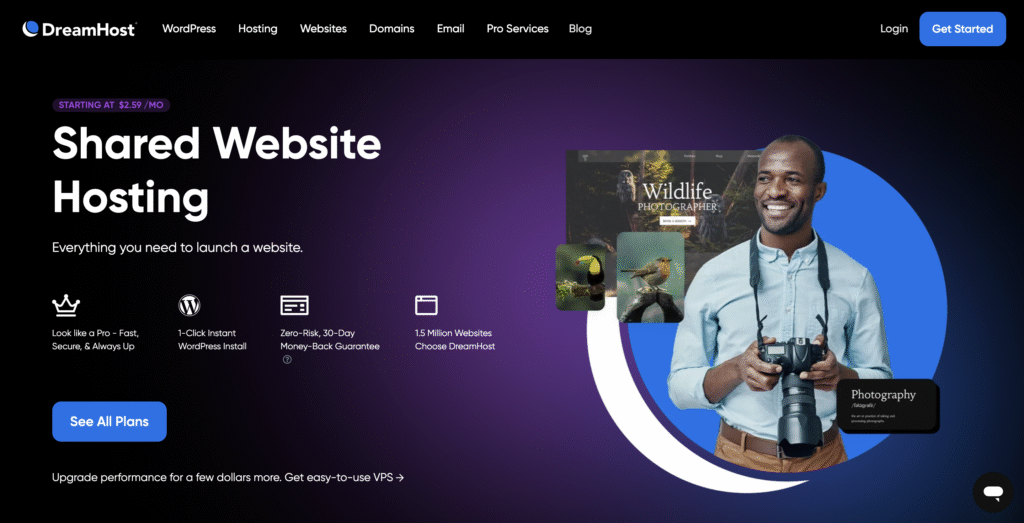
DreamHost stats:
- Best for: Value-seekers and users wanting highly reliable hosting.
- Price: Starting at $2.59/month.
- Resources: Up to unlimited storage, unmetered bandwidth, a free domain, and automated WordPress migrations.
DreamHost stands out from the competition with one of the boldest claims in the industry: a 100% uptime guarantee. This makes it a strong choice for those who prioritize reliability and long-term stability.
Its entry-level plan is also well-equipped, offering 50 GB of storage, a free domain, and daily backups.
The primary trade-off is that the Shared Starter plan does not include email hosting. You must purchase email accounts separately or upgrade to a higher-tier plan, which can be an unexpected cost.
Additionally, while live chat support is available, phone support is only offered as a paid callback service.
Key features:
- Industry-leading guarantees. A 100% uptime guarantee and a 30-day money-back policy provide peace of mind.
- Automated WordPress migrations. A free plugin simplifies the process of moving an existing WordPress site to DreamHost.
- Custom control panel. DreamHost uses its own user-friendly control panel for site management instead of the more common cPanel.
- Pre-installed WordPress. DreamHost pre-installs WordPress on new plans to help you get started faster.
4. SiteGround
SiteGround stats:
- Best for: Beginners and businesses prioritizing performance and support.
- Price: Starting at $2.99/month.
- Resources: Up to 40 GB storage, unmetered traffic, daily backups, and one free domain.
SiteGround has a strong reputation for delivering high-performance, reliable hosting built on the Google Cloud Platform. It’s an excellent choice for beginners and small businesses that prioritize speed and expert customer support.
The platform offers managed WordPress features, an in-house caching tool, and robust security tools.
Keep in mind that this premium service has its limitations. The entry-level StartUp plan is restricted to hosting only one website. Also, while the introductory price is low, the renewal price is substantially higher, increasing to the standard rate of $17.99/month.
Furthermore, the highest-tier plan only has 40 GB of storage, while some providers offer up to 100 GB or even unlimited disk space.
Key features:
- Google Cloud Platform. Hosting on Google’s fast and reliable infrastructure provides a key performance advantage.
- In-house caching. SiteGround’s custom caching solution, SuperCacher, is enabled by default to speed up website loading times.
- Free WordPress Migrator Plugin. An easy-to-use automated plugin that lets you migrate an unlimited number of WordPress sites.
- Expert customer support. SiteGround is widely recognized for providing fast, professional, and knowledgeable technical support.
5. InMotion Hosting
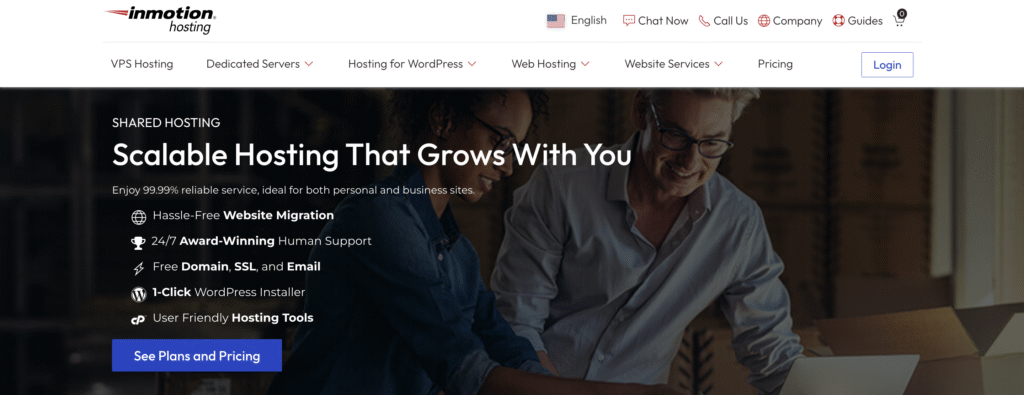
InMotion Hosting stats:
- Best for: US and EU-based small businesses needing reliable performance.
- Price: Starting at $2.99/month.
- Resources: Up to 300 GB NVMe storage, unmetered bandwidth, a free domain, and free SSL certificates.
InMotion Hosting is a well-established provider known for reliability and performance, making it a solid choice for small businesses. It backs its service with a generous 90-day money-back guarantee, giving you plenty of time to determine if it’s the right fit.
All plans include a suite of Google Workspace apps, advertising credits, and a free domain to help new businesses get started.
A key consideration for businesses with a global audience is that InMotion’s infrastructure is focused on North America. Its data centers are located only in the US and Europe, which may affect loading speeds for international visitors.
Key features:
- 90-day money-back guarantee. This is one of the longest trial periods in the industry, so you can test the service thoroughly.
- UltraStack performance. A custom server configuration uses advanced caching to deliver fast loading times for WordPress and other applications.
- Included business tools. Plans come with a free website builder, Google Workspace integration, and $150 in advertising credits.
- US-based support. InMotion Hosting provides knowledgeable customer support from its offices in the United States.
6. HostGator
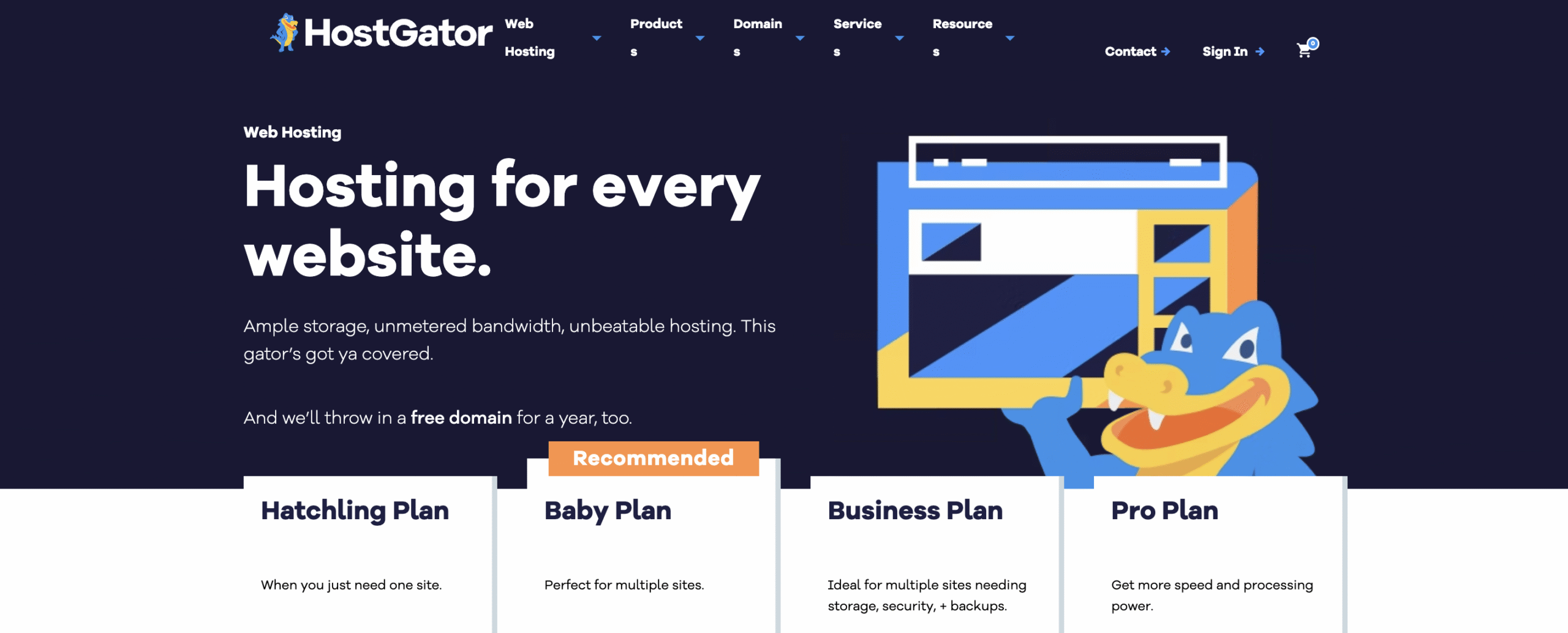
HostGator stats:
- Best for: Beginners looking for a familiar interface with cPanel.
- Price: Starting at $3.95/month.
- Resources: Up to 100 GB SSD storage, unmetered bandwidth, and a free domain for the first year.
HostGator is one of the most recognizable brands in web hosting. It offers beginner-friendly plans that use the familiar cPanel control panel. Its plans cover the basics, providing a free domain, a free SSL certificate, and unmetered bandwidth to get a simple site online quickly.
However, the advertised price can be misleading due to a reliance on upselling. For example, while HostGator includes malware scanners in all plans, you must upgrade to the Business plan or purchase the separate SiteLock feature to remove malware automatically.
The same applies to daily backups, which require an additional fee of $1.99/month. These extra costs can leave your site vulnerable if you don’t opt in.
Key features:
- cPanel control panel. Use this familiar and powerful interface for managing your website files, databases, and emails.
- One-click installs. Installing apps and platforms like WordPress is simple, even for beginners.
- Marketing tools. You get access to a free Yoast SEO plugin, pay-per-click (PPC) services, and email marketing tools to help grow your business.
- 30-day money-back guarantee. Use this industry-standard period to test HostGator’s services risk-free.
7. Ionos
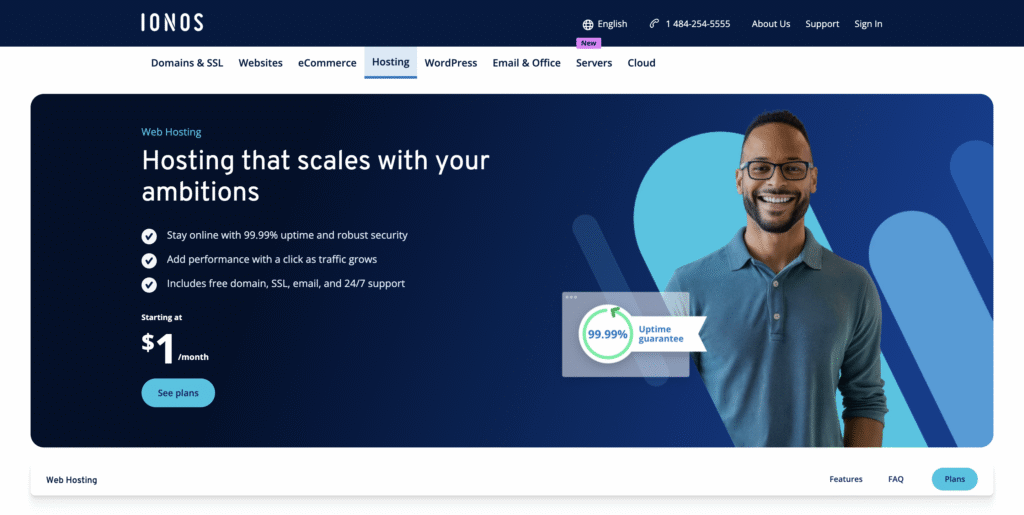
Ionos stats:
- Best for: Users looking for the lowest possible first-year cost.
- Price: Starting at $1.00/month.
- Resources: Up to unlimited storage, unmetered bandwidth, unlimited databases, and a free domain for the first year.
Ionos attracts beginners with one of the lowest introductory prices in the hosting industry, making it a highly affordable way to start a website. For this low entry price, you get a solid package that offers a free domain, daily backups, and a Wildcard SSL certificate to secure all your subdomains.
The main catch with Ionos is its pricing model. The low price for the Plus plan is only for the initial term. The renewal rate is 11 times higher, a significant price jump to factor into your long-term budget.
Furthermore, entry-level plans are performance-limited, and all plans include only one email account with 2 GB of mailbox space.
Key features:
- Personal consultant. Every customer is assigned a dedicated support contact for personalized help free of charge.
- Geo-redundant infrastructure. Your website data is mirrored in two separate data centers, which increases reliability and protection against data loss.
- Wildcard SSL included. The free Wildcard SSL certificate secures your main domain and all its subdomains, a feature many other hosts charge for.
- Performance scaling. You can easily upgrade your site’s performance level to handle traffic spikes as your site grows.
8. Hosting.com
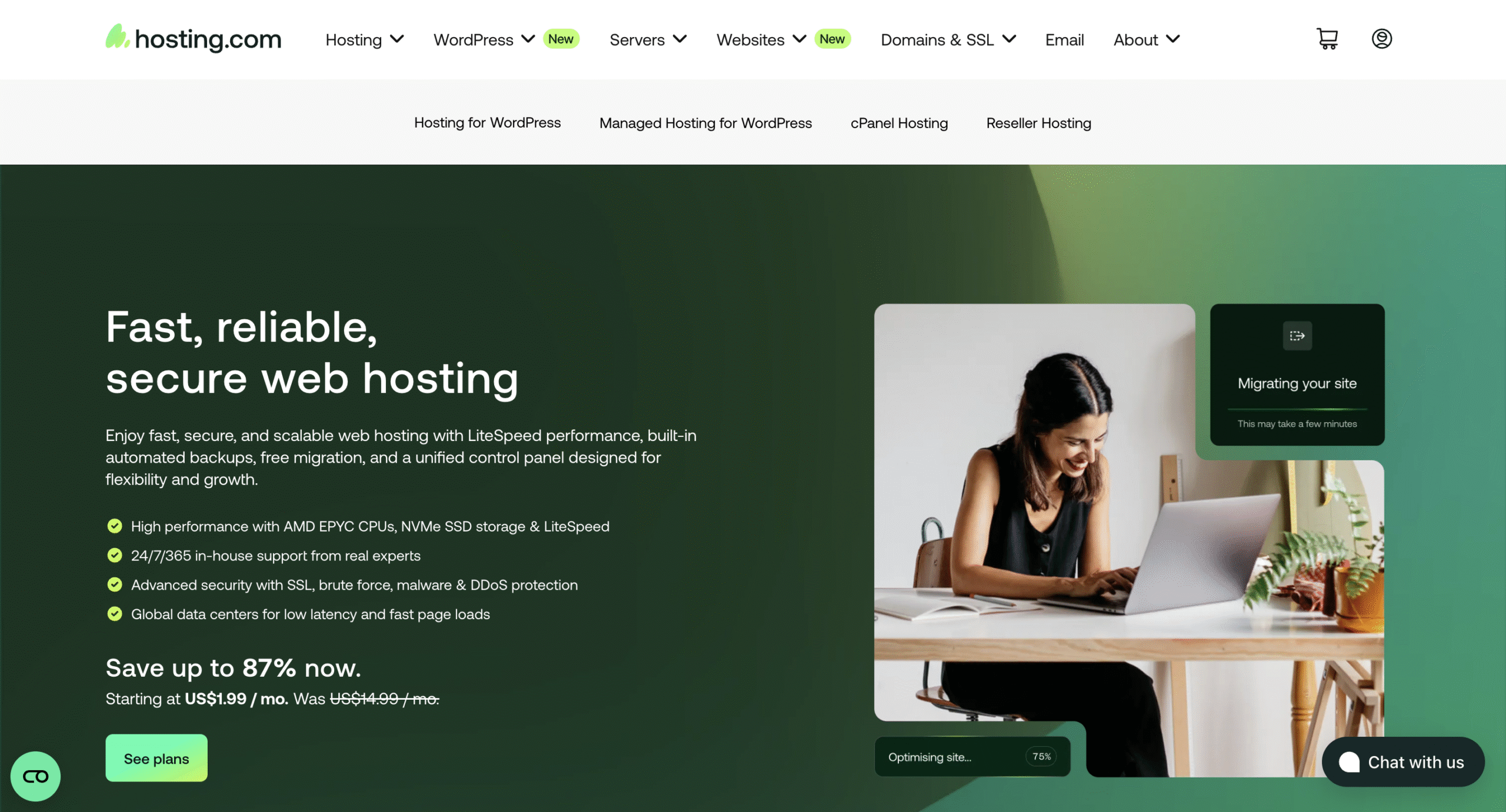
Hosting.com stats:
- Best for: Beginners looking for high-performance hardware and managed migrations.
- Price: Starting at $1.99/month.
- Resources: Up to 100 GB disk space, up to 100 websites, unlimited bandwidth, and a free domain on annual plans.
Formerly known as A2 Hosting, Hosting.com offers fast hosting built on high-performance hardware, including AMD EPYC CPUs, NVMe storage, and LiteSpeed servers. All plans come with a strong security package, including free SSL, advanced malware protection, and weekly backups.
A key benefit is their free migration service, where the in-house team manages the entire process of moving your websites and emails.
However, the most significant consideration is the price increase upon renewal. For example, the Starter plan’s introductory rate of $1.99/month is for a one-year term and renews at a much higher rate of $11.99/month.
This lowest-tier plan is also limited to one website and 15 GB of disk space.
Key features:
- High-performance hardware. All plans run on AMD EPYC CPUs, NVMe SSD storage, and LiteSpeed web servers for fast page loads.
- Free in-house migrations. A 24/7 in-house team will migrate your websites, emails, and domains free of charge.
- Advanced security suite. Every plan includes a free SSL certificate, plus protection against brute force attacks, malware, and DDoS threats.
- Free domain on annual plans. A free domain name is included for the first year with the purchase of any annual plan.
9. Namecheap
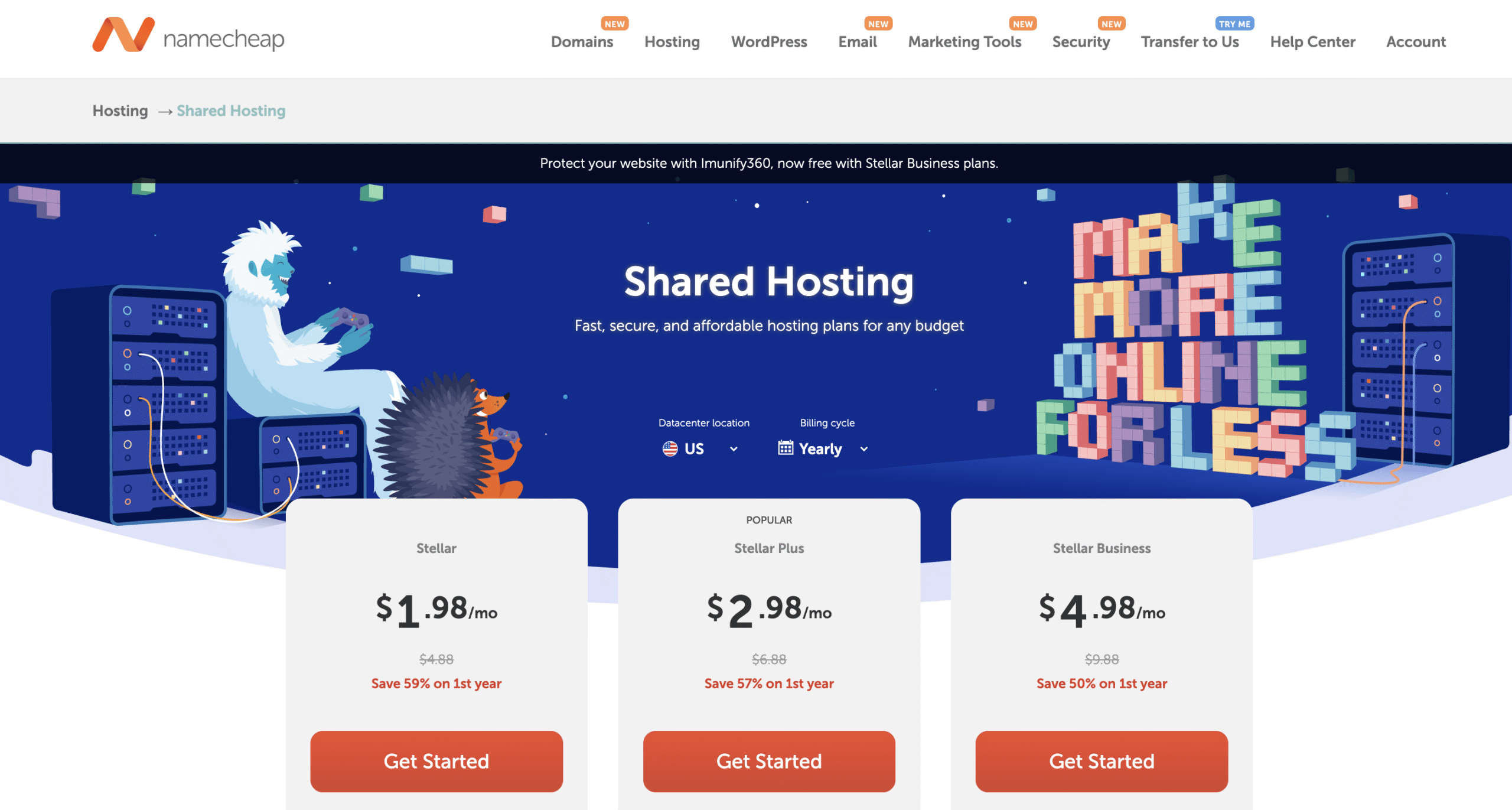
Namecheap stats:
- Best for: Hosting multiple small websites on a tight budget.
- Price: Starting at $1.98/month.
- Resources: Up to 50 GB SSD storage, unmetered bandwidth, a free domain and SSL certificates for the first year.
True to its name, Namecheap offers one of the most budget-friendly hosting solutions on the market. A standout feature is the ability to host up to three websites on its cheapest Stellar plan – a generous offer when most competitors limit you to a single site.
A point of caution is that its free domain offer comes with a significant catch: it does not apply to .com domains. You only receive a discount on .com domain registration, while the free offer applies to less popular extensions.
It’s also worth noting that Namecheap offers free SSL certificates only for the first year, while most competitors provide them for a plan’s lifetime.
Key features:
- Host three websites. The lowest-tier plan lets you host more than one website, which is excellent value for the price.
- Guaranteed fast migration. Namecheap guarantees that they will migrate a cPanel website in under 24 hours with no downtime.
- cPanel included. The service comes with the industry-standard cPanel for easily managing your sites, files, and emails.
- Twice-weekly backups. Plans include automatic backups that run twice a week, so you have a recent restore point.
10. GoDaddy
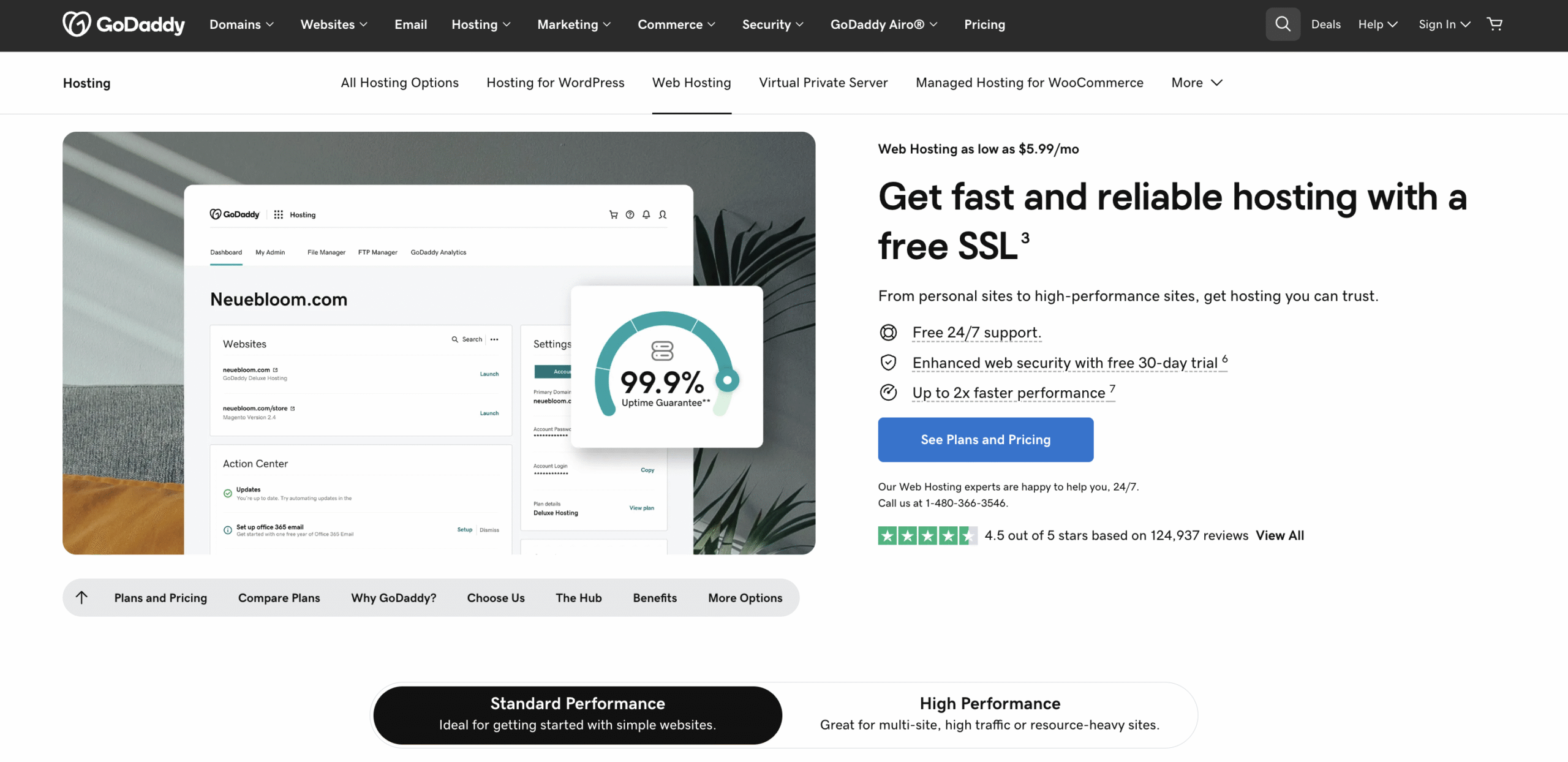
GoDaddy stats:
- Best for: Beginners seeking an all-in-one platform with brand familiarity.
- Price: Starting at $5.99/month.
- Resources: Up to 75 GB NVMe storage, unmetered bandwidth, daily backups, and a free domain for the first year.
As one of the world’s largest domain registrars, GoDaddy offers a convenient all-in-one platform for beginners who want to manage their domain, hosting, and professional email from a single dashboard. Its brand recognition makes it a common starting point for new users.
This convenience comes at a premium, as GoDaddy’s hosting plans are priced significantly higher than the market average.
While the entry-level Web Hosting Economy plan includes a free SSL certificate, it only lasts for the first year. You must pay for renewal or upgrade to a higher-tier plan to continue enjoying free SSL.
Additionally, security features like a WAF and malware scanner are only available as a one-month trial.
Key features:
- Integrated services. A single dashboard to manage domains, email, and web hosting.
- Decent starting storage. The base plan comes with 25 GB of storage, which is enough for most small websites.
- Automatic daily backups. Easily recover your entire hosting account from the previous day if needed.
- 24/7 phone support. GoDaddy provides extensive customer support over the phone, which is a priority for some users.
How to choose the best web hosting service
To choose the best web hosting service, assess your website’s needs and compare providers based on key factors like performance, scalability, support, and overall value. Considering these elements will help you find a plan that fits your project and budget.
- Website type. A simple blog or portfolio has different needs than a high-traffic ecommerce store. For small businesses, a reliable shared hosting plan from a provider like Hostinger is often the perfect starting point.
- Budget and value. While cheap hosting is tempting, focus on value. Look at what’s included in the price – a free domain, SSL certificate, and email accounts will save you money in the long run. Providers like Hostinger offer these essentials even in their lower-tier plans.
- Performance and speed. Look for providers that offer NVMe storage, a CDN, and data centers located close to your target audience. These features directly impact your site’s loading speed, which affects user experience and SEO.
- Platform choice. Decide between WordPress and a website builder. If you plan to use WordPress, look for managed WordPress hosting that includes automatic updates and optimizations. If you prefer a more straightforward, all-in-one solution, choose a provider that includes a high-quality website builder.
- Scalability. Your hosting plan should be able to grow with your website. Check if the provider offers easy upgrades to more powerful plans, like Cloud or VPS hosting, for when your traffic increases.
- Customer support. Reliable customer support is non-negotiable. Look for providers that offer 24/7 support through live chat or phone. You’ll want expert help available immediately if you run into any technical issues.
What to do after getting web hosting?
After getting your web hosting, the next step is to build your website. This process requires you to connect your domain, choose a platform like WordPress, design your layout, and publish your first pages.
To do this effectively, make sure you follow a structured approach. Our complete tutorial on how to create a website provides a detailed plan, breaking down the entire process into 12 clear steps from initial concept to final launch.
All of the tutorial content on this website is subject to Hostinger's rigorous editorial standards and values.
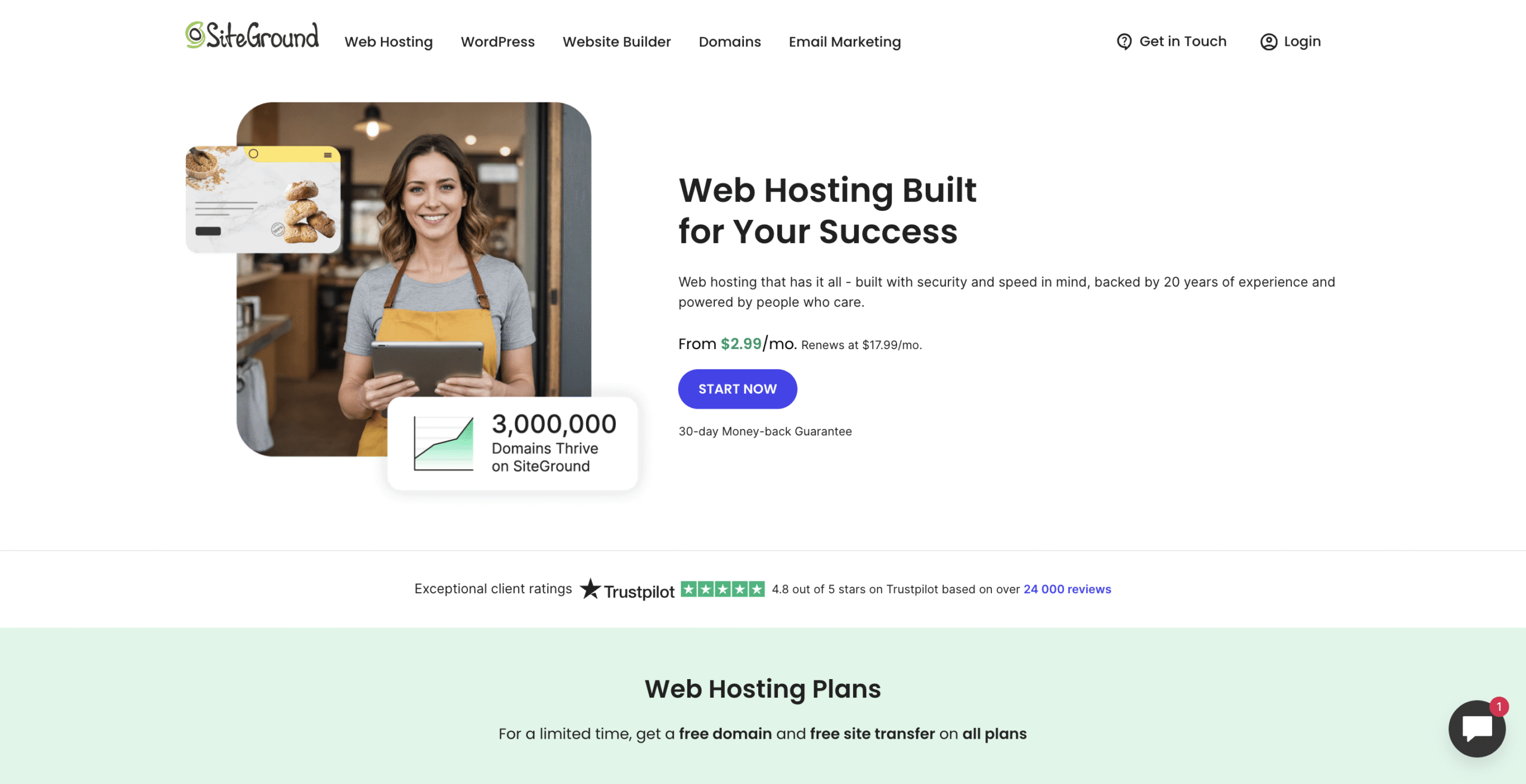


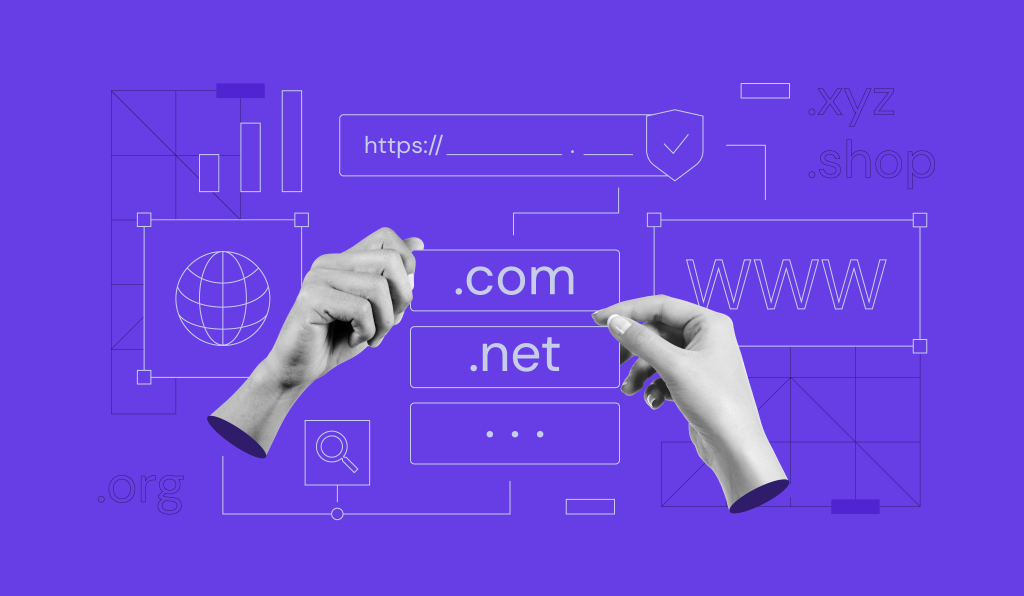

Comments
December 16 2024
I want to buy your domain for three (3) years. What may be special offer for me? Give a Thee Year Plan. We want to book for Three years. Awaiting your early reply. Thank you.
December 18 2024
Thank you for your interest! We offer attractive pricing for longer commitments, and you can find more details about the 3-year plan on our available domains page ;)